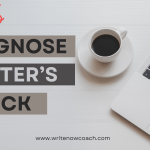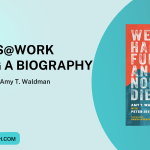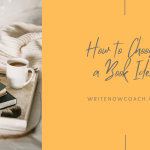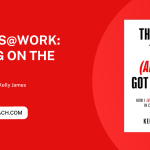The Book Hook: What it is, why you need it, and how to create it by Rochelle Melander
 Do you want to sell your book?
Do you want to sell your book?
Dumb question: who doesn’t want to sell millions of copies of their book, right?
Here’s the thing: whether you want to sell your book directly to readers (self-published) or first to agents or editors (traditionally published), you must be able to articulate what it’s about in a single enticing sentence.
As a writing coach, I talk to people every single day who have written a book and cannot tell me what it’s about. Instead, I get something like: “Uh, well, uh, it’s, I guess it’s about . . . “ and they’re off on a mostly incomprehensible summary of what they’re writing. If you want to sell your book (and I know you do), you need to have a phenomenal book hook.
1. What it is. According to AgentQuery, the book hook is “a concise, one-sentence tagline for your book.” The book hook usually contains a few key elements: type of book, main character, and the central conflict or quest of the book. Here are three examples:
Eat, Pray, Love by Elizabeth Gilbert. In this memoir, a messed up, just-divorced woman finds peace through a spiritual quest that takes her to Italy, India, and Indonesia.
The Help by Kathryn Stockett. In this novel, a young rich white woman helps black maids tell their story in 1960s Mississippi.
Outliers by Malcom Gladwell. This book teaches readers what factors contribute to success and how you and your children can replicate them.
2. Why you need it. While it helps to have a book hook to make sparkling conversation at dinner parties and with writing coaches, the hook really does serve as a key tool at every point in the writing process:
Before you write the book, the hook helps you test market the idea with friends, booksellers, and others. Why write a book that’s been done before or that won’t interest anyone? Take your book hook public as a conversation topic, speech, or blog post and see what kind of reaction you get.
While you are writing the book, your book hook will keep you focused. When you’re tempted to jump off onto yet another meandering tangent or subplot, you can look at the book hook and remember the central theme and purpose of your book.
After you’ve written the book, your book hook will help you sell it to editors, agents, booksellers, bloggers, and the rest of your adoring public.
3. How to create a book hook.
Read. The best way to learn how to write book hooks is to read them. Look at book jacket copy, reviews, and author websites until you “get” the formula.
Know the key elements. Start by jotting down the key elements for your book hook. As you do so, remember you are writing this hook with your ideal reader in mind. What will he or she want to know? What will sell the reader on your book? What problem will you solve for him? What enticing adventure will you take her on?
If you’re a fiction writer, the key elements of a book hook often include:
*type of book
*main character
*central conflict or quest of the book
*location
*era
If you’re writing a nonfiction book, your elements include:
*central problem the book addresses or teaches readers to overcome (perhaps with some anecdotal evidence or statistics to aid you in hooking the reader)
*the ideal reader (e.g., overworked parents who need help managing tasks and children)
*the solution (you don’t have to give it all away, but let us know what you’re providing—maybe a ten-step program to help people lose weight)
Write and Revise. Write a draft of your own book hook. Rewrite it. Play with word order and verb choices. After you have a draft you like, test it out on a few people. Don’t worry if you have to rewrite it hundreds of times—the work will help you sharpen your understanding of both your book and how to sell it. A great hook gets used repeatedly throughout the life of a book—so it’s well worth the time and effort to get it right.
Your turn: what book hook sold you recently? Leave your comment below.















Here’s mine for my forthcoming debut novel, terminalrage.com Work in progress.
In this thriller, a burned-out former FBI hostage negotiator faces off with an enigmatic terrorist who’s come back to New York to settle the ultimate score.
Sounds interesting!
Pingback : How To Write A Hook For A Fiction Book? – Tagari.com